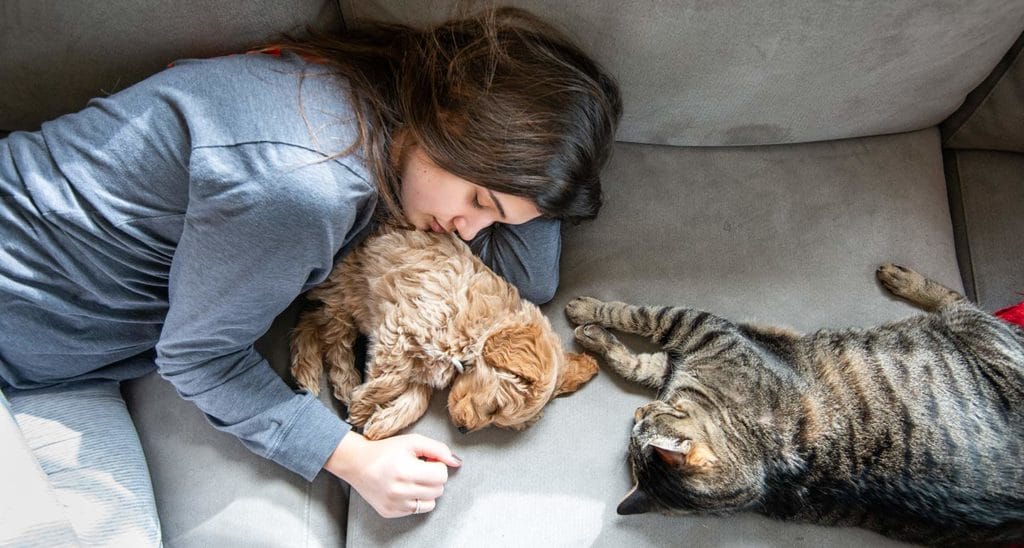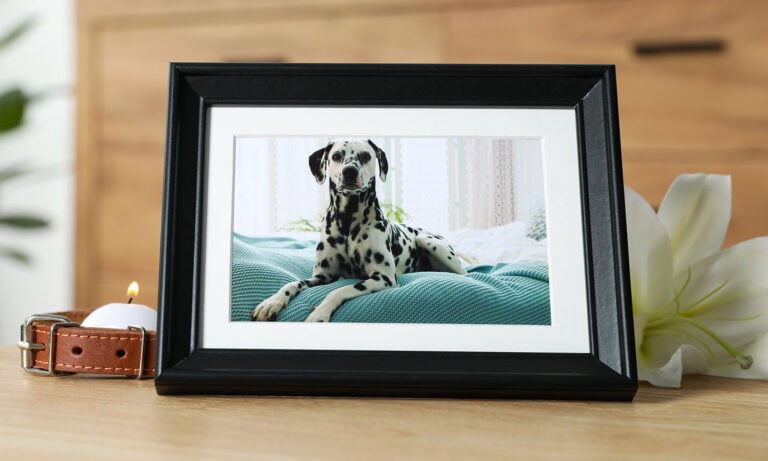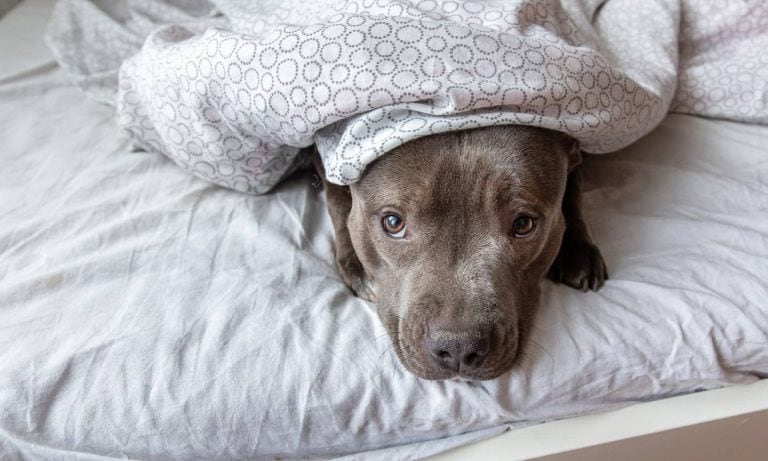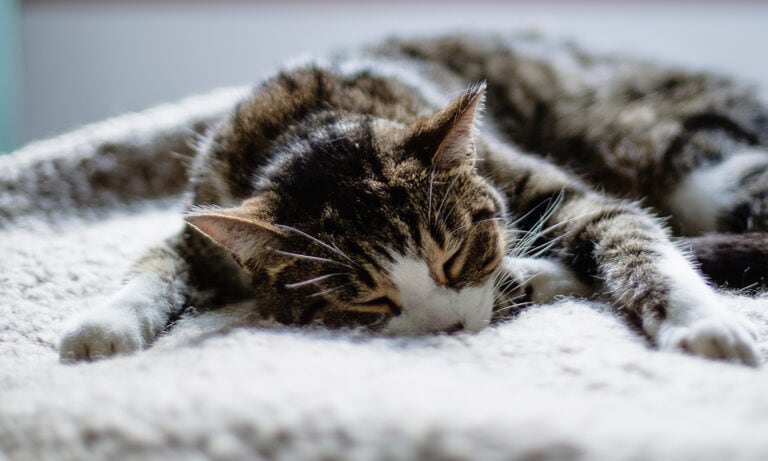After months of social distancing, you and your pets may have settled into a sort of temporary normal. Now, you’re used to being together 24/7, having your pet perched on your lap during conference calls or snuggled next to you on the couch during a Netflix bingefest—but things are changing.
As cities and states start to cautiously reopen, experts warn that we need to be on the lookout for signs of stress, both for you and your pet. We’re here to walk you through what to expect—and what steps to take to ease that transition.
A Change Is Coming… Again
“There’s going to be [another] new normal,” says Prairie Conlon, LMHP (Licensed Mental Health Professional) and Clinical Director of Therapetic, an online tele-health platform.
On the upside, that means many of the things stressing you out right now—like being apart from loved ones or struggling to work from home while parenting—will at some point be in your rear-view mirror.
But here’s the downside: Whatever routines you’ve invented for yourself during social distancing are about to go out the window. And routine is incredibly important for mental health—both for you and your pet.
"Everyone's going to have to find their new normal." —Prairie Conlon, LHMP
“Most mammals, whether it’s humans or dogs or cats, are very routine-oriented,” says veterinary behaviorist Dr. Amy Pike, DVM, DACVB, IAABC-CABC, of Animal Behavior Wellness Center in Fairfax, Virginia. “It provides structure and stability and predictability. And the more of that you have in your life, the less stressed you are.”
Though some pets may welcome the return of alone time in their lives—Dr. Pike jokes that one of her dogs will be thrilled to see her high-energy kids return to school someday—others may have gotten a bit too reliant on the extra attention they’ve been getting.
“Many of these pets who got used to our presence all the time are going to be potentially showing signs of separation anxiety when we all go back to work,” Dr. Pike says.
Prepping Your Pet
Luckily, Dr. Pike says, there are several steps you can take now to help your pet with that transition. The first is to put a little bit of distance between you and your precious pup or favorite feline for at least a small part of the day.
“You should spend some time away from your pet, whether that’s closing yourself in your office during your workday or leaving the house for a walk by yourself. It reminds the pet that ‘Yes, I do leave the house without you. You don’t get to come with me every single time,’” she says.
"Separation anxiety doesn't just go away on its own." —Dr. Amy Pike, DVM
When you go away, Dr. Pike says, remember to leave your pet with something to do. If your dog loves their KONG Classic toy, for example, stuff it with their favorite filling to help distract them from the stress of your absence.
And when it’s time to return to work, Dr. Pike adds, keep a close eye on your pets—with a pet camera, if possible. “I definitely recommend that we video our pets when we go back to work, so we make sure we aren’t missing their signs of anxiety.”
The most common of those signs, Dr. Pike says, include:
- Panting
- Whining
- Scratching at the door
- Chewing or clawing your property
- Potty accidents
“The more extreme signs are destruction of property, pooping or peeing inside the house, that type of thing,” Dr. Pike says. “But there are subtle signs, too, and if we don’t deal with those subtle signs, things we wouldn’t notice without video, we can end up with the more extreme signs.”
Learn more about the signs of stress in pets.
If you do notice signs of separation anxiety in your dog or cat, Dr. Pike says, it’s time to call in the pros: “Seek out the help of a veterinary behaviorist or certified separation anxiety trainer immediately.” They can recommend tactics that will make your absence less scary to your furry friend, such as giving your dog a favorite toy or treat before you leave your home, or erasing your cat’s negative association with your housekeys by jingling them at random intervals during the day, not just when you’re headed out the door.
Learn more about how to help separation anxiety in dogs and separation anxiety in cats.
“Separation anxiety doesn’t just go away on its own,” Dr. Pike says. “It needs to be addressed before it worsens.”
Preparing Yourself
Tending to our own mental health through this transition is a bit more complicated. “We can’t define what the new normal looks like just yet,” Conlon points out. So, how do you prepare for the unforeseeable?
“It’s easier said than done, but try to relax your expectations,” she says. Even after the pandemic has passed, she says, things are going to be different compared to our “normal” lives several months ago. Remind yourself that it’s natural to feel worried, she advises, and “just take things day by day and slowly adjust to it.”
If you’re feeling overwhelmed by stress, spending time with your pet can help. Play with them, snuggle them, and let yourself be pulled into their mindset, Conlon advises.
“The animal is mindful,” she says. “They’re not worried about mistakes they made yesterday. They’re not worried about tomorrow. They’re just thrilled in the moment.”
When you’re in that moment with your pet, Conlon adds, it disconnects you from stressful thoughts.
"Try to relax your expectations. Just take things day by day." —Prairie Conlon, LHMP
“Then take it a step further,” Conlon advises. “Get a little bit of exercise with your pet, whether it’s playing with them on the floor or going for a walk.” Both you and your pet will feel refreshed after getting some fresh air or a brisk game of tug-of-war in the living room.
Ultimately, Conlon says, give yourself and your pet plenty of grace as you navigate this process—and try to be understanding with the rest of the world, too.
“Everyone’s going to have to find their new normal, and everybody will be impacted differently based on their personal beliefs, their perception, their own life experiences,” she says. “Understanding and preparing for that can make a huge difference.”
Read more:
Share:












